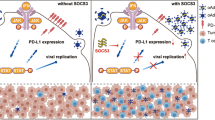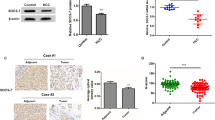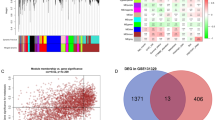Abstract
Signal transducer and activator of transcription 3 (STAT3) is constitutively activated in diverse cancers, which contributes to the proliferation and survival of cancer cells by upregulating apoptosis inhibitors and cell cycle regulators. Suppressor of cytokine signaling 1 (SOCS1) is an important negative regulator of STAT pathways and is frequently silenced in many types of cancers. In this study, we used oncolytic adenoviral vector to deliver SOCS1 gene (AdCN305-SOCS1) to treat hepatocellular carcinoma (HCC). Our data showed that SOCS1 was downregulated in HCC cells by hypermethylation. AdCN305-SOCS1 was found selectively replicated, which led to SOCS1 overexpression in HCC cells. Infection of HCC cells with AdCN305-SOCS1 resulted in inhibition of STAT3 phosphorylation and downregulation of survivin, cyclin D1, Bcl-xL and C-myc. AdCN305-SOCS1 exhibited strong cytotoxicity to HCC cells by inducing apoptosis in vitro and in vivo. This study suggests that transfer of SOCS1 by an oncolytic adenovirus may be a potent antitumor approach for cancer therapy.
This is a preview of subscription content, access via your institution
Access options
Subscribe to this journal
Receive 12 print issues and online access
$259.00 per year
only $21.58 per issue
Buy this article
- Purchase on Springer Link
- Instant access to full article PDF
Prices may be subject to local taxes which are calculated during checkout







Similar content being viewed by others
References
Yu H, Pardoll D, Jove R . STATs in cancer inflammation and immunity: a leading role for STAT3. Nat Rev Cancer 2009; 9: 798–809.
Yu H, Kortylewski M, Pardoll D . Crosstalk between cancer and immune cells: role of STAT3 in the tumour microenvironment. Nat Rev Immunol 2007; 7: 41–51.
Devarajan E, Huang S . STAT3 as a central regulator of tumor metastases. Curr Mol Med 2009; 9: 626–633.
Kim DJ, Chan KS, Sano S, Digiovanni J . Signal transducer and activator of transcription 3 (Stat3) in epithelial carcinogenesis. Mol Carcinogen 2007; 46: 725–731.
Yu H, Jove R . The STATs of cancer—new molecular targets come of age. Nat Rev Cancer 2004; 4: 97–105.
Bromberg JF, Wrzeszczynska MH, Devgan G, Zhao Y, Pestell RG, Albanese C et al. Stat3 as an oncogene. Cell 1999; 98: 295–303.
Bromberg J . Stat proteins and oncogenesis. J Clin Invest 2002; 109: 1139–1142.
Turkson J, Jove R . STAT proteins: novel molecular targets for cancer drug discovery. Oncogene 2000; 19: 6613–6626.
Sun J, Blaskovich MA, Jove R, Livingston SK, Coppola D, Sebti SM . Cucurbitacin Q: a selective STAT3 activation inhibitor with potent antitumor activity. Oncogene 2005; 24: 3236–3245.
Chau MN, Banerjee PP . Development of a STAT3 reporter prostate cancer cell line for high throughput screening of STAT3 activators and inhibitors. Biochem Biophys Res Commun 2008; 377: 627–631.
Yang L, Ma X, Xiao L, Tang M, Weng X, Sun L et al. Uniquely modified RNA oligonucleotides targeting STAT3 suppress melanoma growth both in vitro and in vivo. Cancer Biol Ther 2009; 8: 2065–2072.
Wang Y, Ma X, Yan S, Shen S, Zhu H, Gu Y et al. 17-Hydroxy-jolkinolide B inhibits signal transducers and activators of transcription 3 signaling by covalently cross-linking Janus kinases and induces apoptosis of human cancer cells. Cancer Res 2009; 69: 7302–7310.
Hutzen B, Friedman L, Sobo M, Lin L, Chen L, De Angelis S et al. Curcumin analogue GO-Y030 inhibits STAT3 activity and cell growth in breast and pancreatic carcinomas. Int J Oncol 2009; 35: 867–872.
Greenhalgh CJ, Miller ME, Hilton DJ, Lund PK . Suppressors of cytokine signaling: relevance to gastrointestinal function and disease. Gastroenterology 2002; 123: 2064–2081.
Park Y, Shon SK, Kim A, Kim KI, Yang Y, Cho DH et al. SOCS1 induced by NDRG2 expression negatively regulates STAT3 activation in breast cancer cells. Biochem Biophys Res Commun 2007; 363: 361–367.
Ko E, Kim SJ, Joh JW, Park CK, Park J, Kim DH et al. CpG island hypermethylation of SOCS-1 gene is inversely associated with HBV infection in hepatocellular carcinoma. Cancer Lett 2008; 271: 240–250.
Miyoshi H, Fujie H, Moriya K, Shintani Y, Tsutsumi T, Machuuchi M et al. Methylation status of suppressor of cytokine signaling-1 gene in hepatocellular carcinoma. J Gastroenterol 2004; 39: 563–569.
Okochi O, Hibi K, Sakai M, Inoue S, Takeda S, Kaneko T et al. Methylation-mediated silencing of SOCS-1 gene in hepatocellular carcinoma derived from cirrhosis. Clin Cancer Res 2003; 9: 5295–5298.
Nagai H, Naka T, Terada Y, Komazaki T, Yabe A, Jin E et al. Hypermethylation associated with inactivation of the SOCS-1 gene, a JAK/STAT inhibitor, in human hepatoblastomas. J Hum Genet 2003; 48: 65–69.
Yoshikawa H, Matsubara K, Qian GS, Jackson P, Groopman JD, Manning JE et al. SOCS-1, a negative regulator of the JAK/STAT pathway, is silenced by methylation in human hepatocellular carcinoma and shows growth-suppression activity. Nat Genet 2001; 28: 29–35.
Calvisi DF, Ladu S, Gorden A, Farina M, Conner EA, Lee JS et al. Ubiquitous activation of Ras and Jak/Stat pathways in human HCC. Gastroenterology 2006; 130: 1117–1128.
Flowers LO, Subramaniam PS, Johnson HM . A SOCS-1 peptide mimetic inhibits both constitutive and IL-6 induced activation of STAT3 in prostate cancer cells. Oncogene 2005; 24: 2114–2120.
Luo J, Xia Q, Zhang R, Lv C, Zhang W, Wang Y et al. Treatment of cancer with a novel dual-targeted conditionally replicative adenovirus armed with mda-7/IL-24 gene. Clin Cancer Res 2008; 14: 2450–2457.
Zhao L, Gu J, Dong A, Zhang Y, Zhong L, He L et al. Potent antitumor activity of oncolytic adenovirus expressing mda-7/IL-24 for colorectal cancer. Hum Gene Ther 2005; 16: 845–858.
Pei Z, Chu L, Zou W, Zhang Z, Qiu S, Qi R et al. An oncolytic adenoviral vector of Smac increases antitumor activity of TRAIL against HCC in human cells and in mice. Hepatology 2004; 39: 1371–1381.
Sherr CJ, McCormick F . The RB and p53 pathways in cancer. Cancer Cell 2002; 2: 103–112.
Zhang W, Cai R, Luo R, Wang Y, Cui Q, Wei X et al. The oncolytic adenovirus targeting to TERT and RB pathway induced specific and potent anti-tumor efficacy in vitro and in vivo for hepatocellular carcinoma. Cancer Biol Ther 2007; 6: 1726–1732.
Rivera AA, Wang M, Suzuki K, Uil TG, Krasnykh V, Curiel DT et al. Mode of transgene expression after fusion to early or late viral genes of a conditionally replicating adenovirus via an optimized internal ribosome entry site in vitro and in vivo. Virology 2004; 320: 121–134.
Carette JE, Graat HC, Schagen FH, Abou EL, Hassan MA, van Beusechem VW et al. Replication-dependent transgene expression from a conditionally replicating adenovirus via alternative splicing to a heterologous splice-acceptor site. J Gene Med 2005; 7: 1053–1062.
Joliot A, Prochiantz A . Transduction peptides: from technology to physiology. Nat Cell Biol 2004; 6: 189–196.
Gusarova GA, Wang I, Major ML, Kalinichenko VV, Ackerson T, Petrovic V et al. A cell-penetrating ARF peptide inhibitor of FoxM1 in mouse hepatocellular carcinoma treatment. J Clin Invest 2007; 117: 99–111.
Bruix J, Hessheimer AJ, Forner A, Boix L, Vilana R, Llovet JM . New aspects of diagnosis and therapy of hepatocellular carcinoma. Oncogene 2006; 25: 3848–3856.
Qian C, Liu XY, Prieto J . Therapy of cancer by cytokines mediated by gene therapy approach. Cell Res 2006; 16: 182–188.
Qing C, Lou W, Shen J, Ma L, Yang Z, Liu L et al. Potent antitumor activity in experimental hepatocellular carcinoma by adenovirus-mediated co-expression of TRAIL and shRNA against COX-2. Clin Cancer Res 2010; 16: 3696–3705.
Penuelas I, Mazzolini G, Boan JF, Sangro B, Marti-Climent J, Ruiz M et al. Positron emission tomography imaging of adenoviral-mediated transgene expression in liver cancer patients. Gastroenterology 2005; 128: 1787–1795.
Sangro B, Mazzolini G, Ruiz J, Herraiz M, Quiroga J, Herrero I et al. Phase I trial of intratumoral injection of an adenovirus encoding interleukin-12 for advanced digestive tumors. J Clin Oncol 2004; 22: 1389–1397.
Cui Q, Jiang W, Wang Y, Lv C, Luo J, zhang W et al. Transfer of suppressor of cytokine signaling 3 by an oncolytic adenovirus induces potential antitumor activities in hepatocellular carcinoma. Hepatology 2008; 47: 105–112.
Aghi M, Robert LM . Oncolytic viral therapies—the clinical experience. Oncogene 2005; 24: 7802–7816.
Mathis JM, Stoff-Khalili MA, Curiel DT . Oncolytic adenoviruses—selective retargeting to tumor cells. Oncogene 2005; 24: 7775–7791.
Acknowledgements
This work was supported by funds from National Natural Sciences Foundation of China (30872984) and National Basic Research Program of China (973 Program, No. 2010CB529406).
Author information
Authors and Affiliations
Corresponding author
Ethics declarations
Competing interests
The authors declare no conflict of interest.
Rights and permissions
About this article
Cite this article
Liu, L., Li, W., Wei, X. et al. Potent antitumor activity of oncolytic adenovirus-mediated SOCS1 for hepatocellular carcinoma. Gene Ther 20, 84–92 (2013). https://doi.org/10.1038/gt.2012.4
Received:
Revised:
Accepted:
Published:
Issue Date:
DOI: https://doi.org/10.1038/gt.2012.4



